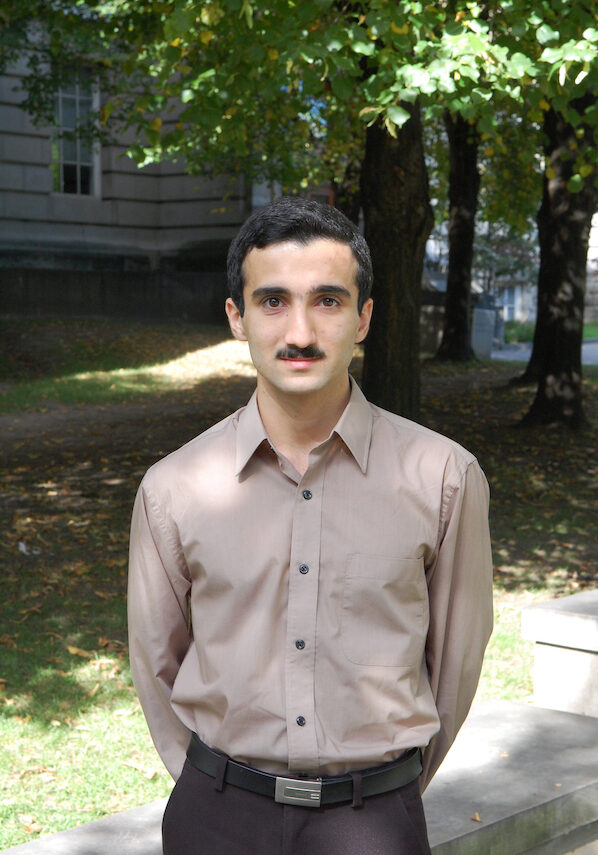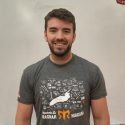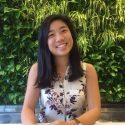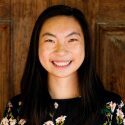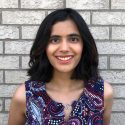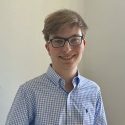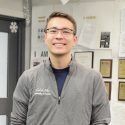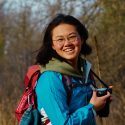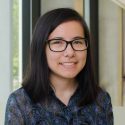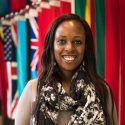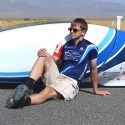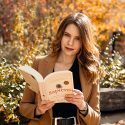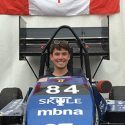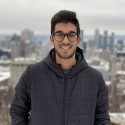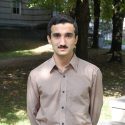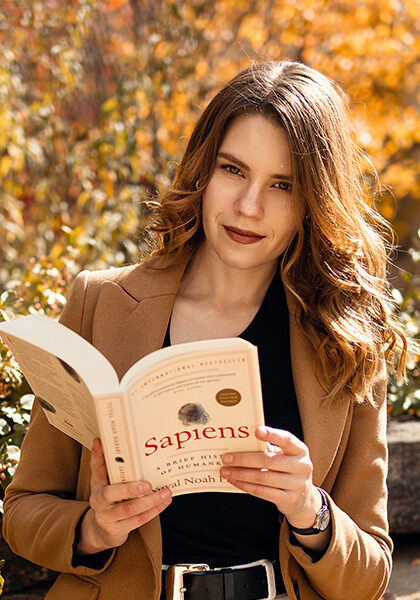U of T ENGINEERING
Grads to Watch 2021
Story by Liz Do & Tyler Irving
With the University’s virtual Convocation ceremony on June 23, 2021 U of T Engineering students mark the end of one journey and the beginning of another.
Having enriched the U of T Engineering community as undergraduate and graduate students, they will join our vibrant, global network of Skule™ alumni, where they will continue to address pressing challenges around the world and inspire the next generation.
This year’s 14 “Grads to Watch” — selected by their home departments and institutes — embody the spirit of U of T Engineering. Their stories illustrate the creativity, innovation and global impact that define our community. Watch their next steps!
OPTIMIZING COMPLEX SYSTEMS
Kyle Booth (MIE PhD 2T1)
Booth has always had a passion for optimization. “There is something particularly satisfying about finding provably optimal solutions to problems,” he says.
Inspired by the rapid electrification of the transportation industry, Booth’s dissertation proposes optimization-based strategies for coordinating fleets of electric vehicles and battery-powered autonomous robots. “My work can be used to help owners of electric vehicle fleets manage these assets in more intelligent, cost-effective ways,” he says.
From 2016 to 2017, Booth served as co-president of the University of Toronto Operations Research Group, a student-run organization that brings together students with an interest in the application of advanced analytical methods to help make better decisions. He also served as the President for a competition known as the Toronto Operations Research Challenge in both 2018 and 2019.
In 2017, he spent the summer at the NASA Ames Research Center in California, where he conducted an internship with the quantum computing group. His research focused on developing techniques for optimally compiling quantum circuits to real-world quantum computing architectures.
“Completing a graduate degree at U of T Engineering has opened many doors for me as a researcher,” he says. “I gained a toolkit of algorithms, models, and paradigms that allow me to effectively tackle interesting and hard problems. I have also learned the value of building a network of colleagues, which will make future collaborations and brainstorming much easier.”
Booth has recently returned to the NASA Ames in the role of Associate Scientist. His ongoing research investigates ways that classical optimization techniques can bolster near-term quantum computing efforts, and how quantum computing can accelerate existing optimization paradigms.
“I'd like to thank Professor J. Christopher Beck (MIE) and the rest of my “family” at the Toronto Intelligent Decision Engineering Laboratory. You're all amazing and I wish you the best."
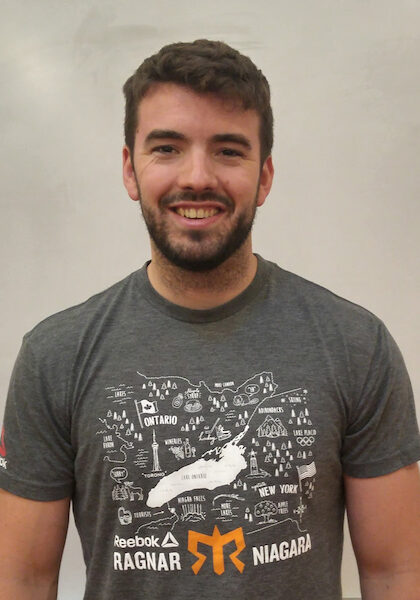
advancing biotechnology
Samantha Cheung (ChemE PhD 2T1)
Throughout her degree program, Cheung searched for opportunities to advocate for her fellow graduate students by serving on committees, organizing events and launching new student life programs.
“One of the most important skills I developed during my PhD is emotional intelligence,” she says. “Working with so many people from different backgrounds helped me become a better leader, co-worker, and person.”
An active member of the Graduate Engineering Council of Students (GECoS), Cheung started a Mental Wellness Commission and an Equity, Diversity & Inclusion Commission, both of which have made key recommendations to enhance graduate student life.
She also led the creation of the first ever U of T Engineering Research Conference, which took place virtually last June.
“I'm also still in awe over how quickly my team put it together,” she says. “It is so important for graduate students to practice presenting their work, and to have a way to connect with each other, especially when labs were shut down due to COVID-19.”
Cheung’s own research focused on optimizing growing conditions for microalgae, single-celled organisms that can produce chemicals used in everything from biofuel to nutritional supplements and cosmetics. Combining this expertise with her leadership experience will, she hopes, enable her to make a difference in Canada’s biotech industry.
“I believe that harnessing the power of biology will be an important part of a more sustainable future,” she says. “I want to be one of the people conducting this impactful research.”
“I want to thank my supervisors, Professors Grant Allen (ChemE) and Steven Short (Biology), and my family who have been there throughout the highs and lows and supported each decision I’ve made. I’m also thankful to have met my partner, Nathan, while TAing and I’m excited to be finishing our PhDs together!"
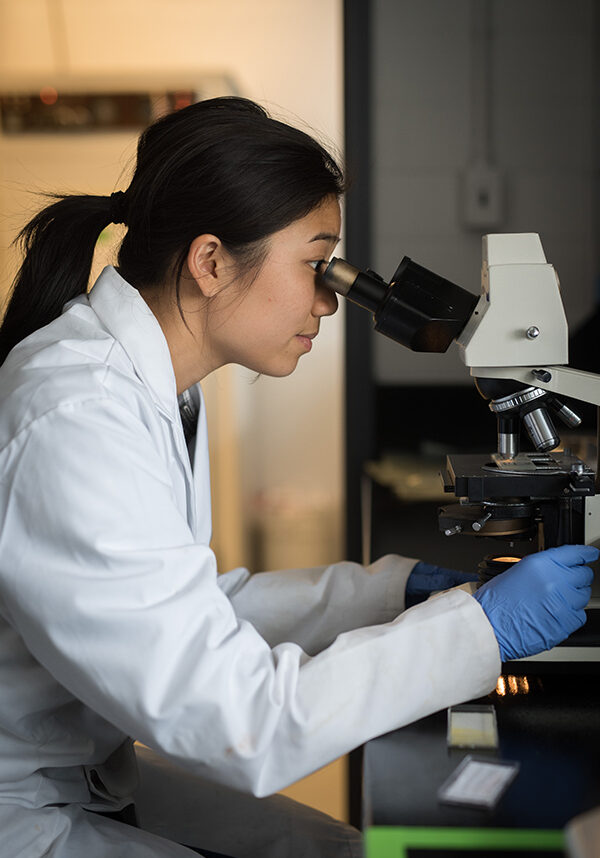
Building community
Karen Chu (CivE 2T0 + PEY)
Throughout her undergraduate studies, Karen Chu has jumped at any opportunity to both represent U of T Engineering and to be a voice for her peers.
She joined the CivClub, quickly moving up each year, from mentorship director to becoming the student club’s chair. As a student ambassador working in the Engineering Recruitment Office, she helped prospective students make the decision to choose U of T Engineering. And through the Girls' Leadership in Engineering Experience initiative, run by the Engineering Outreach office, she shared her experiences to inspire the next generation of female engineers.
Like many civil engineering students, Chu says the highlight of her studies was Survey Camp. She and her classmates built their class monument, which consisted of a clear resin table that encased mementos from their undergraduate years, a tetherball pole, and a concrete stepping stone with their class year written on it with mosaic tiles.
“This experience incorporated all the elements of U of T Engineering — teamwork, designing and building, fun with friends, hard work and challenges, and a lasting impact,” says Chu.
Her biggest lesson from her undergraduate experience is to never give up and to never hesitate to ask for help — a message she wants to share with current and upcoming first years.
“Asking for help when needed has been vital to my personal growth,” she says. “I also learned the importance of community and communication. No work, especially in engineering, can be done alone and we need to be able to understand each other to accomplish goals together.”
Upon graduation, Chu plans to pursue a career in residential construction and apply her knowledge of building science to design sustainable homes.
"I would like to thank the CivMin Department, staff and professors, for their continued support, Civ Club for helping me develop my soft skills, and the Civil Engineering community for welcoming me into the family and providing a place to call home. I would also like to give a shoutout to the CIV2T0 class. It's been a wild journey but your kindness and comradery have made it an unforgettable experience."
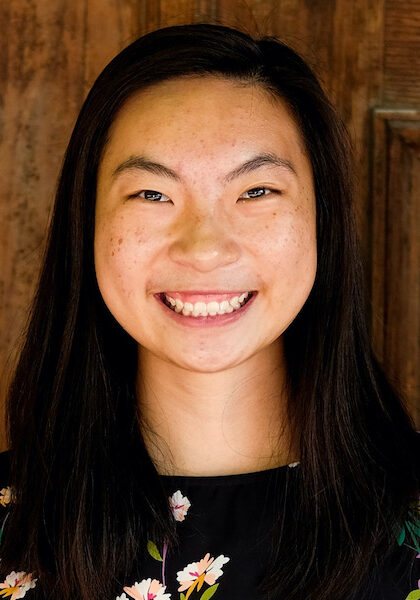
Advocating social change
Chinmayee (May) Gidwani (EngSci 2T0 + PEY)
Throughout her studies at U of T Engineering, Gidwani’s guiding principle has been to help build a sense of belonging among students, whether welcoming new engineering students as part of the F!rosh Week team, or as the Engineering Society’s equity and inclusivity director.
“Being the EDI director was challenging, but I learned so much about different perspectives of the diverse student body, and how to approach reconciling them to come up with solutions that don't leave anyone behind,” says Gidwani.
In her final year at U of T Engineering, Gidwani completed an undergraduate thesis on ethics in artificial intelligence (AI), where she developed a practical framework to approach ethical AI development. This work could be helpful in her future endeavors, as she returns to her PEY Co-op placement at AMD to work on operating systems.
If she could describe her engineering experience in one word, Gidwani says the word is “Rewarding.”
“Even though these past few years at U of T have been challenging, it has been incredibly rewarding to learn and grow from these experiences,” she explains. “All the late-night study sessions and last-minute group meetings have made me more confident in my abilities as a leader and engineer.”
"I'd like to give a shout-out to everyone involved with the Engineering Society! Thank you for volunteering your time to help manage our budget, organize events, advocate for students, and making the Skule™ community such a welcoming and lovely place."
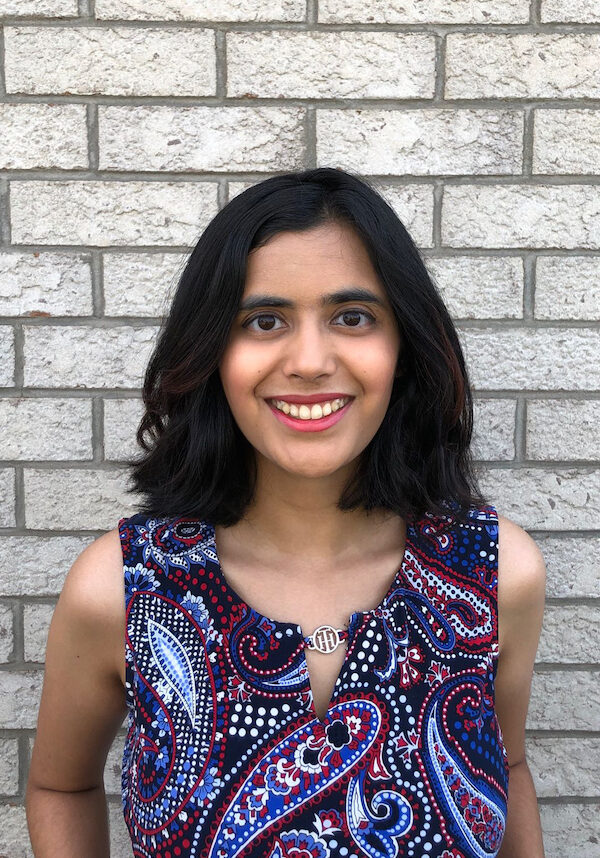
DESIGNING BIOELECTRONICS
Adam Gierlach (ECE 2T0 + PEY)
For an electrical engineering graduate, Gierlach has spent a lot of time in medical research labs. He spent the summer after his first year at Holland Bloorview Kids Rehab Hospital, doing research under the supervision of Dr. Azadeh Kushki (BME). After his second year, Gierlach joined the Neuron to Brain Lab at Toronto Western Hospital, headed by Dr. Taufik Valiante.
“We developed a microelectrode neural interface testbench, enabling the development and validation of next-generation implantable smart medical devices,” says Gierlach.
Such devices monitor electrical activity in the brain and, using smart algorithms, provide corresponding electrical stimulation. They could one day be used to prevent seizures or offer new treatments for conditions such as epilepsy, Parkinson’s and dementia.
After his third year, Gierlach worked in the Koch Institute for Integrative Cancer Research at MIT, a position he landed through U of T’s Professional Experience Year Co-op program. There, he designed electronic devices that can travel through the human digestive system, non-invasively gathering data that can be used to diagnose gastric disorders.
Gierlach is currently in an internship with Apple working with the Health Sensing Hardware team. In September, he’ll head back to MIT to begin a PhD program.
“I made so many great connections and explored various opportunities,” says Gierlach. “The U of T community is warm and friendly, and there’s always a helping hand to provide new insights or connect you with someone who can.”
Gierlach has always been keen to pay it forward: he was a TA for APS100 Orientation to Engineering, a course that helps first-year students make the transition to university. He also mentored fellow students through the GEARS program and served as an ECE Ambassador.
“I loved being one of the first faces welcoming prospective students into our amazing community,” he says. “I want to give everyone the tools they need to succeed, and it makes my very happy to see students thrive and find their path.”
“I would like to thank my amazing research supervisors throughout the years: Professors Azadeh Kushki (BME), Taufik Valiante (Max Planck - University of Toronto Center for Neural Science and Technology) and Giovanni Traverso. Under their leadership and guidance, they enabled me to have an impact in the biomedical community and deepen my passion for biomedical research."
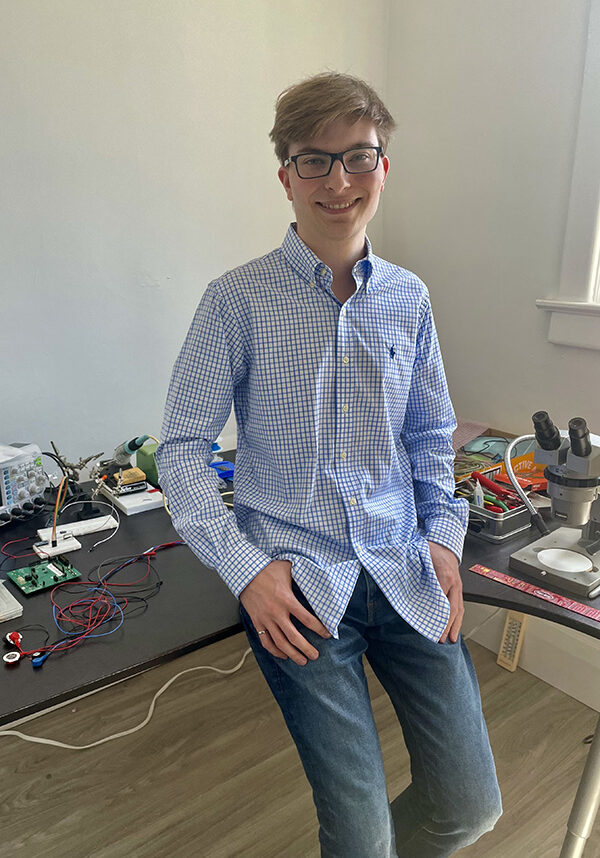
CATALYZING GLOBAL COLLABORATION
Fletcher Han (ChemE 2T0 + PEY)
Born in a small town in New Zealand, and with heritage stretching across Northern Europe and East Asia, Han has lived in all over the world, including the Netherlands, which he still considers home. He chose U of T Engineering in part because its global community reflected his own background.
“I wanted to learn from world-renowned professors and a cohort of talented minds from all over,” he says. “I was also keen to push my own boundaries while helping my fellow students with personal and professional development.”
Han chaired both the local chapter of the Canadian Society for Chemical Engineering and the Association of Leadership in Chemical Engineering. After his third year, he spent 16 months working as a Trade Floor Technology Consultant for Scotiabank through the PEY Co-op program, where he designed web tools to optimize trade floor operations.
In addition to earning the U of T International Engineering Scholar Award upon acceptance, Han also received the U of T Class of 8T2 Emerging Leaders Award, the U of T Class of 5T9 Emerging Leaders Award, and a University of Toronto Student Leadership Award. Next fall, he’ll head to Tsinghua University in Beijing as U of T’s first engineering student to receive a Schwarzman Scholarship.
In his final year, Han completed two major projects with a global engineering focus: an interdisciplinary capstone project in water insecurity and an undergraduate thesis about malnutrition.
“The success of a design relies not only the skills of engineers,” he says. “To enact global change, politics, business, and international relations must also have a seat at the table. Recognizing the importance of this, I hope to join a company in the future that values diversity to ensure that all voices are heard, and revolutionary solutions can be put forth.”
“I would like to thank all my mentors, especially Professors Yu-Ling Cheng (ChemE) and Levente Diosady (ChemE) for your unparalleled guidance as my thesis supervisors. A big thank you to all my friends for your unfaltering support across these five years — engineering is a team sport, and I couldn’t have done it without you!"
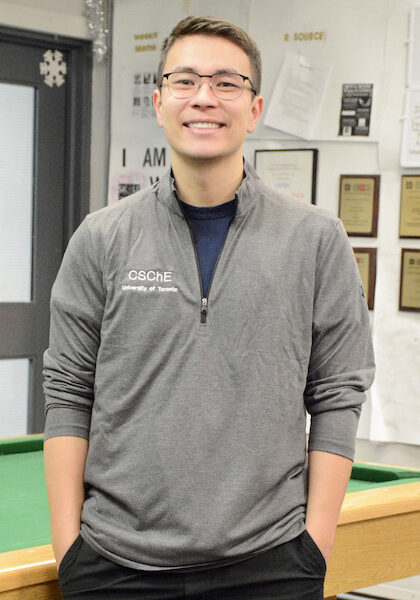
protecting the environment
Yilin Huang (MSE 2T0 + PEY)
It was while working as a park ranger in Killarney Provincial Park, near Georgian Bay in Ontario, that Huang first realized the power of drones.
“During the summer after first year, a team of researchers came to the park with industrial drones for environmental monitoring,” she says. “I became really invested in the idea of using them to monitor and preserve whole, intact ecosystems and keep these places wild.”
Huang’s passion led her around the world. After her second year, she headed to the Karlsruhe Institute of Technology in Germany, where she co-authored a publication on a spectral library of urban materials used as training data for drones. This was followed by an academic exchange to the National University of Singapore where she specialized in Southeast Asian environmental management strategies.
After her third year, Huang spent a year in Switzerland on a Professional Experience Year Co-op internship at Flyability, a drone start-up that specializes in collision-tolerant inspection drones.
“What I learned is that when it comes to new technology, in many instances it’s not functionality that’s lacking, but rather regulations that prevent efficient implementation,” she says. After Convocation, she aims to bridge this gap by pursuing a Master’s degree in Science, Technology & Policy at ETH Zurich in Switzerland.
Outside of her research, Huang is an active proponent of effective altruism and is a fellow with Stanford’s Effective Altruism Fellowship. She is also an avid violinist, playing with Skule™ Nite's Band, the Lausanne Student Chamber Orchestra in Switzerland, and the Hart House Orchestra, with whom she performed at Carnegie Hall in 2017.
Huang has some advice for new students.
"Instead of asking yourself what degree you'll get in five years, ask yourself what kind of person you want to be in five years,” she says. “Seek the experiences that build towards that and the degree will find a way to work.”
"A huge shout out to my academic advisor, Sabrin Mohamed. Behind every cool experience is a myriad of logistical hoops — without her, I would not have been able to navigate them. My heart is always full from my family and friends, who have shown me the kind of person I want to be."
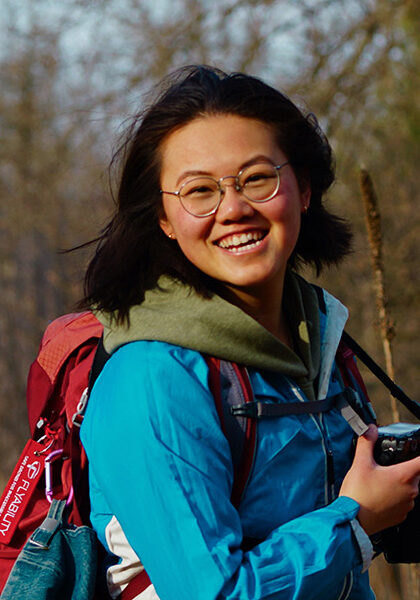
rallying THE SKULE™ SPIRIT
Dana Kokoska (ECE 2T0 + PEY)
Every year, Dana Kokoska volunteered at Girl’s Leadership in Engineering Experience (GLEE), an annual event to inspire young female students to pursue engineering at U of T. It’s one of the many outreach and community-driven extracurricular activities Kokoska took part in, or led, during her undergraduate studies.
She was the Hi-Skule™ Director, leading a team to design and run outreach initiatives for high school and middle school students, as well as the Vice-Chair Marketing for F!rosh Week this past fall. In the latter role she faced unprecedented challenges, as Kokoska and her team had to find a way to rally the Skule™ spirit, adapt F!rosh traditions, and help welcome first-year students to U of T Engineering — without stepping foot on campus.
“Working with an incredibly driven Orientation Committee to deliver F!rosh Week to the incoming class during a pandemic is an experience I will never forget,” she says.
Overcoming obstacles like a virtual F!rosh Week has shown Kokoska the importance of perseverance.
“U of T Engineering was one of the hardest things I’ve done in my life. I struggled a lot, especially in first and second year, with academics and finding a work-life balance,” says Kokoska. “As I continued in my studies, I learned how to adapt to new challenges. Perseverance, effort, as well as a lot of practice, led me to improve myself overall and gave me opportunities I would have never imagined having. For that I am extremely grateful.”
After graduation, she will begin working at Honeywell Aerospace as an Electromagnetic Compatibility Electrical Engineer. But just like her time at U of T Engineering, she is already carving out time for extracurriculars: “I am also opening a small business, Daydreamy Design, to pursue my passion for the visual arts.”
“I’d like to thank each and every person in the Skule™ engineering community who has become my friend, helped me with homework, stopped to chat with me, or comforted me when I was feeling down. Going to the Pit after class or work was truly the highlight of each (in-person) day in undergrad, and I will forever cherish all the conversations, laughs and people I met there and at U of T in general. I would also like to thank my Hi-Skule™ Executive team for inspiring so many future engineers, and my Orientation Marketing and Exec teams for being amazing friends to have in a very uncertain time."
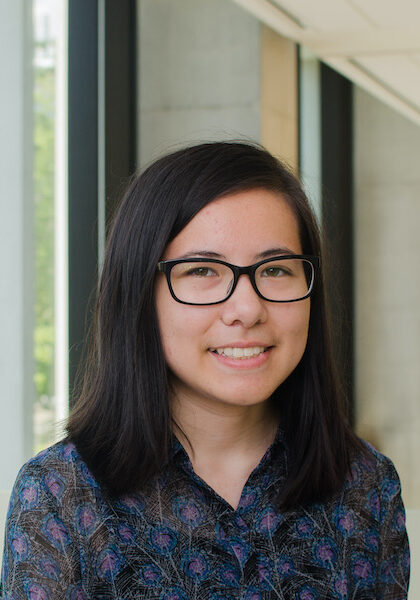
catalyzing sustainability
Chibulu (Lulu) Luo (CivMin PhD 2T1)
“I am passionate about using my engineering skills to address global challenges,” says Chibulu (Lulu) Luo.
Luo’s doctoral research examined current and future trends of energy use and greenhouse gas emissions in one of Africa’s largest and fastest growing cities, Dar es Salaam in Tanzania.
“What was most exciting about my research was the opportunity to explore important sustainability and energy sector questions and conduct extensive fieldwork in Dar es Salaam,” says Luo. “I appreciate the fact that I led doctoral work that both aligns with this passion and aims to inform policies and investments for improved energy access and societal well-being in developing countries.”
In Dar es Salaam, Luo coordinated a diverse team of local graduate students, who helped to administer her research survey to more than 1,300 households across the city. Her research has also taken her to Ghana, Zambia and Rwanda.
She says one of her proudest moments during her time at U of T Engineering was helping to lead the Faculty’s Engineering Education for Sustainable Cities in Africa (EESC-A) project.
“I still have fond memories of 2018, a time when two of my EESC-A colleagues travelled from Toronto to Dar es Salaam to mark EESC-A’s presence at a policy workshop that I was planning as part of my fieldwork,” she recalls. “My memory is still painted with the joyous image of our after-workshop dinner and celebration at a beachfront restaurant in Dar es Salaam.”
Luo is currently working as a consultant with the World Bank’s Climate Investment Funds, providing research and strategic expertise to various renewable energy projects around the world.
She says she’s not entirely sure what the future holds, but “I certainly want to continue fuelling my passion for research, teaching and topics that are globally relevant and significant.”
“A big thank you to my supervisor, Professor Heather MacLean (CivMin). Heather gave me space to delve into different topics, some of which did not make it to the written pages of my final thesis, but which were essential to developing my research questions and goals. I also appreciated our many conversations on research ideas or life in general – especially last year given the initial uncertainties of navigating research and life at home amid a global pandemic. I look forward to staying in touch with Heather over the course of my career."
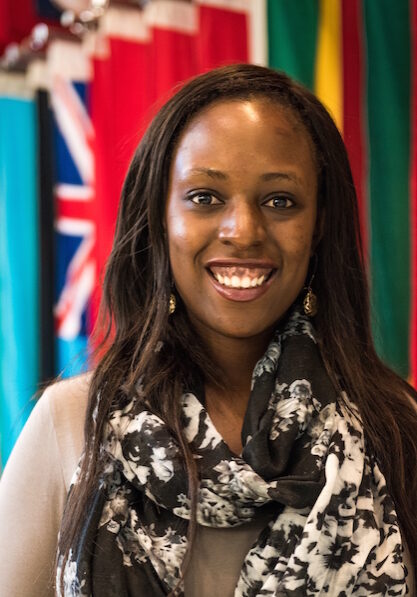
Driving vehicle innovation
Calvin Moes (MSE PhD 2T1)
Moes is wrapping up more than a decade at U of T Engineering, having previously completed his BASc and MASc degrees here. He says part of what he enjoys is the freedom to make his own choices.
“I can aim high with nobody telling me to be more reasonable or realistic, but at the same time, I’m not shielded from the consequences of mistakes,” he says. “I’ve learned a lot from both good and not-so-good decisions.”
Since 2012, Moes has been heavily involved with the Human Powered Vehicles Development Team, and has contributed to a number of record-setting achievements: the Sikorsky Prize-winning flight of the Atlas human-powered helicopter in 2013, taking the top spot at the World Human Powered Speed Challenge in 2017, and setting a new record for the world’s fastest tandem bicycle in 2019.
His research, supervised by Professor Glenn Hibbard (MSE), relates to sandwich panels, which are composite materials used as components in aircraft and other vehicles.
“Sandwich panels are very structurally efficient, but the usual combinations of material make them difficult or impossible to recycle,” he says. “My structures can be recycled directly, and I've also been able to improve their strength-to-weight beyond any comparable alternative products.”
After graduation, Moes plans to work in the aerospace industry. But first, he’s going to take a trip across Canada and the U.S. in a retrofitted camper van. “After 11 years of post-secondary education, it's high time for a meaningful vacation,” he says.
“I'd like to thank Professor Jun Nogami (MSE) for supporting me and the Human-Powered Vehicles Design Team all these years. He's always been our biggest fan and helped us to find the space, tools, and people we needed to pursue our dreams, but at the same time he's let my teammates and I press forward on our own to set goals and succeed or fail according to our own abilities and motivations — a vital learning experience either way."
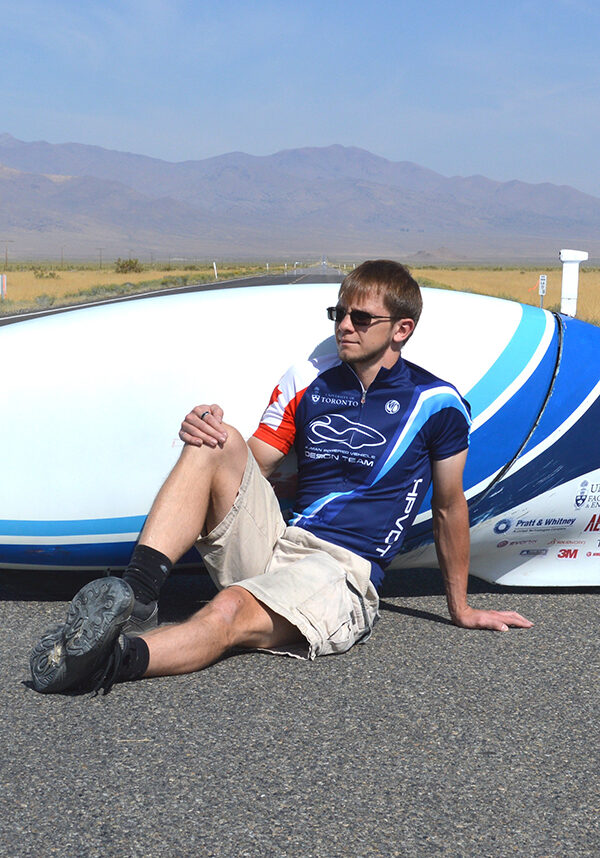
SHINING LIGHT ON CANCER
Marta Overchuk (BME PhD 2T1)
For Overchuk, completing her PhD has felt like riding a roller coaster. “It brought some of the most rewarding experiences of my life, but it also taught me not to be afraid of failures, and to learn from them,” she says.
Her thesis focused on the use of light and light-activated molecules to destroy cancer cells with precision. Specifically, she explored how this approach could be combined with nanomedicine to improve the uptake of chemotherapeutics in tumors. The goal is to reduce toxicity while maintaining positive outcomes for cancer patients.
Overchuk earned a Vanier Canada Graduate Scholarship from NSERC, as well as a Research Expansion Grant from U of T’s Photonics Innovation Centre, which funded a research exchange to the Thayer School of Engineering at Dartmouth College in Hanover, N.H. After graduation, she will take up a postdoctoral fellowship at the University of North Carolina at Chapel Hill.
Outside of her research, Overchuk is passionate about making science accessible to everyone. She communicates relevant science through short-form videos which she shares on her social media channels. She also maintains the connection with her alma mater in Ukraine and delivers workshops to undergraduate and high-school students interested in studying abroad. By sharing her academic journey and career advice, she strives to provide students in Ukraine with resources and information that were not easily accessible when she was studying there herself.
Overchuk says that collaboration is key to doing high-impact science.
“My advice to grad students would be to find your niche and embrace working with others,” she says. “Not only does it enrich your science and allow you to grow your scientific network, but it also makes your experience so much more enjoyable!”
“I want to thank my supervisor, Professor Gang Zheng (BME) for creating a wonderful environment to grow and thrive in and always believing in my potential. I'd also like to thank my supervisory committee members, Professors Brian Wilson (Medical Biophysics) and Warren Chan (BME) who are true leaders in their fields as well as incredible mentors."
POWERING UP ELECTRIC VEHICLES
Ben Sprenger (MechE 2T0 + PEY)
Sprenger has made the world his classroom. In his second year he and his sister, fellow U of T student Jillian Sprenger, travelled to Sri Lanka to film a documentary about climate change. The film, The Road to Colombo, was selected for inclusion in the Vancouver International Film Festival.
“The arts, particularly filmmaking, have always been a huge part of my life – just as important to me as my engineering interests,” says Sprenger.
A year later, Sprenger travelled to Mongolia, where he conducted interviews with nomadic people about a government program that provided them with portable solar generators. The goal was to learn what factors made the program a success, and to see if they could be replicated elsewhere.
That fall, Sprenger travelled to Oxfordshire, U.K. to take up a PEY Co-op internship with Williams Advanced Engineering. The company was contracted to design and vehicles for Panasonic Jaguar Racing to enter in the Formula E championship, the world's only all-electric racing series.
Sprenger was already familiar with the sport, having led the University of Toronto Formula Racing Team at competitions in Brooklyn, Mich. and Most, Czech Republic. At Williams, he contributed to both the 2020 and 2021 vehicles. His proudest moment was when the team placed first at the ABB FIA Formula E Championship, held in Mexico City in February 2020.
The pace of the last four years has been exciting for Sprenger, and it’s not slowing down anytime soon — after graduation, he’ll be moving to California for a stint as a battery engineering intern at Tesla.
“I feel like I have been catapulted at lightning speed from one incredible project to the next,” he says. “What that taught me is that I learn best by drawing from experiences in as many disparate fields as possible. For me, the ‘lightbulb’ moments come when I make a conscious effort to blur the traditional lines between disciplines.”
“I cannot thank the entire U of T Formula Racing team enough, including all the team members and faculty advisors. This team was the defining experience of my undergraduate degree, and I can directly attribute my positive experiences to the skills and connections I built through this team. I have never met a group of people so eager to learn and to help each other become better engineers."
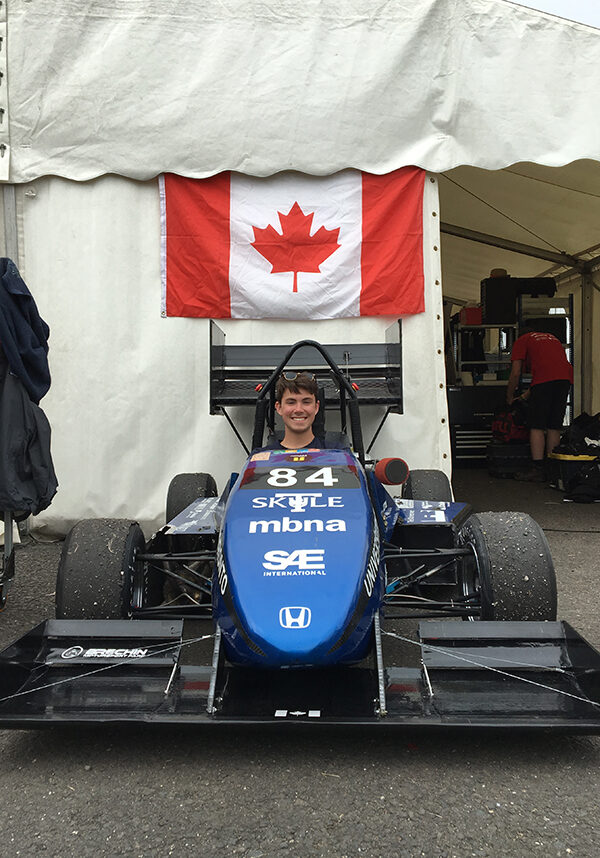
SOARING HIGHER
Zayne Thawer (EngSci 2T0 + PEY)
Thawer is the first in his family to attend post-secondary education, and like many students, struggled with ‘impostor syndrome’ when he first arrived at U of T Engineering.
“I definitely felt like I did not belong at first,” he says. “But I slowly worked through that fear by increasing my participation in extracurricular activities and building relationships with my peers and professors.”
One program that Thawer found valuable was the NSight Mentorship Program, which pairs first- and second-year students in Engineering Science with upper year students for guidance and advice. Thawer eventually became the co-chair of the program, overseeing more than 200 mentees and 70 mentors per year, as well as hosting academic workshops and professional seminars.
He also focused on gaining research experience. After his second year, he began working with researchers at the Toronto Rehabilitation Institute, using a virtual reality driving simulator to study the effects of cannabis use on driving performance and safety. After his third year, as well as for his undergraduate thesis, he analyzed unsteady aerodynamic effects over transonic aircraft wings with Professor David Zingg (UTIAS).
For his PEY Co-op internship, Thawer worked at Safran Landing Systems, collaborating with engineers in France, England, and the United States on the design of the upcoming Aerion Supersonic AS2 business jet. Next fall, Thawer is headed to the California Institute of Technology to pursue a PhD in aerospace engineering.
“Over the past five years, I have learned so much from some of the best professors in Canada and incredible group of peers in the Engineering Science program,” he says. “The knowledge and skills I have developed have given me the confidence to pursue my dreams and make a difference in the world.”
"I would love to thank the entire Engineering Science family, including my incredible peers, insightful professors, and supportive faculty, for allowing me to become a member of such a welcoming community! I would also like to say how grateful I am to my supervisors, Professors David Zingg (UTIAS), Bruce Haycock and Jennifer Campos, for preparing me for the next phase of my academic journey. Thanks to all my friends and family — I can't wait to see what's next!"
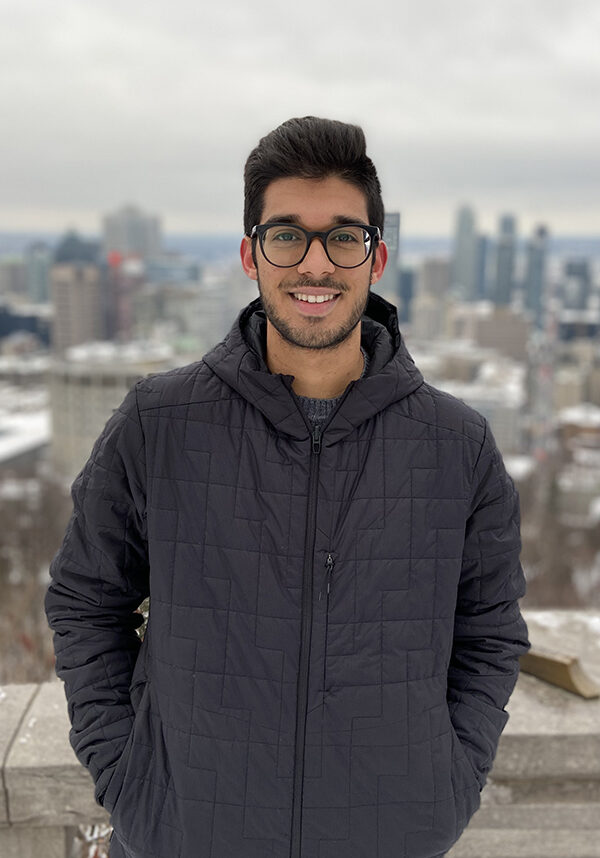
LAUNCHING NEW SPACE TECHNOLOGIES
Behrad Vatankhahghadim (UTIAS PhD 2T1)
Vatankhahghadim is a triple graduate of U of T Engineering, having completed his BASc in Engineering Science in 2014, and his Master’s at UTIAS in 2016. His PhD research involved solar sails — large and thin membranes that capture the momentum of photons and use it to propel space vessels.
“A key challenge is ensuring their successful deployment from their compact folded forms inside the spacecraft into their large final shapes,” says Vatankhahghadim. “I developed mathematical models to simulate the deployment motion, assess its stability, and even make approximate predictions of the expected wrinkling regions.”
In 2018, Vatankhahghadim spent the summer as an intern at the Canadian Space Agency headquarters in Longueuil, Que. There he examined the novel techniques for removing “space junk” — such as inoperable satellites or debris from previous missions — which can pose collision hazards.
In his spare time, he took advantage of language courses offered by U of T’s Faculty of Arts & Science, working his way up to advanced Italian, Russian and French.
Vatankhahghadim is currently working on guidance, navigation, and control aspects of microsatellite missions as a staff member at the UTIAS Space Flight Laboratory. He has also secured some funding to undertake a postdoctoral research project in a few months, “somewhere far away and, hopefully, interesting and beautiful.”
“I am considering other planets, but for now, I suppose I will have to settle for Earth,” he says.
“Within the U of T community, I would like to thank my twin brother — who has been going through EngSci and graduate studies (but in ECE) with me — and my entire research group: my excellent supervisor Professor Chris Damaren (UTIAS), my brilliant labmates, and our beloved plants that have grown alongside us through the years."
